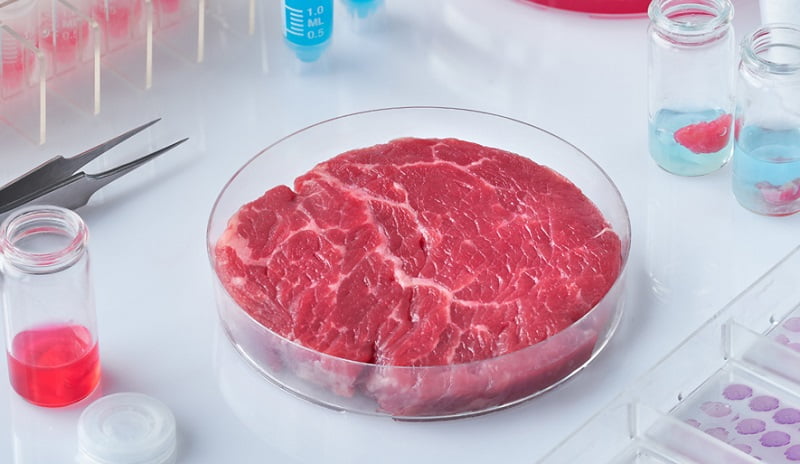Will Vegetarians Eat Lab-Grown Meat

Laboratory meat is not vegan! You might say that laboratory meat, which is known by its name and is produced in a laboratory, so what's wrong with it?!
Although the number of animals that are killed for the production of cultured meat is greatly reduced, they still need animals for the production of laboratory meat. When scientists first created artificial meat, they started with muscle cells from a living pig. However, cell culture and tissue culture usually do not survive forever and do not have the ability to reproduce. So to be able to produce meat in larger quantities, scientists regularly need pigs, cows, chickens and other animals to use their cells.
In fact, artificial meat is taken from the muscle cells of an animal, although the harvesting of these cells can be done by biopsy and without killing the animal. Then these cells are grown in an environment called a culture medium (a broth of nutrients, growth factors and water) where the cells multiply and after a while a trillion cells grow from one muscle cell. These muscle cells are then allowed to naturally fuse together to form the muscle tissue that may eventually be made into a hamburger or steak. The animal cells are usually grown in a vessel medium called fetal bovine serum (FBS), which is extracted from the hearts of live fetal calves and is incredibly cruel. which has emerged suggests that plants and fermentation cultures can be used to produce growth factors and proteins as an alternative strategy to using FBS.
Does artificial meat have a place in the vegan diet?
Although it is obvious that laboratory and cell cultured meats are not produced mainly for the vegetarian and vegan market, and considering the current production process and the use of FBS, it does not have a place in the diet of vegans and vegetarians, but it is possible to replace farmed animals on the plate of meat eaters. and if this happens, billions of animal lives could potentially be saved every year, according to Prof. Mark Post, Chief Scientific Officer of Mosa Meat, their mission is to produce real meat for the world's growing population that is healthier and more environmentally friendly. and the main idea is that meat eaters can produce conventional meat without cruelty or negative environmental effects such as greenhouse gas emissions, land use, deforestation, excessive use of water, loss of biodiversity and the use of anti Biotics eat meat. There are also discussions about the possibility of changing the components of laboratory meat in order to reduce its harm to human health, so as a small member of the vegan community, I support the process of producing artificial meat or laboratory meat, however, it is recommended that if Your health and the planet earth is your concern, you can become vegetarian and vegan at best!
It is worth noting that lab-grown meat producers are being interviewed by environmental and plant-based media, and some (including Mozza Meat in the Netherlands and Al-Farms in Israel) have announced that they have achieved this, which is a positive step. In order to improve the land, they have removed it.
What is the most undeniable benefit of laboratory meat?
Lab-grown meat poses a growing risk of antibiotic resistance and zoonotic diseases (transmitted from animals to humans) such as bird flu, swine flu, BSE, and coronaviruses such as the one that caused the Covid-19 pandemic. It reduces a lot. Scientists have been warning us for years that the world's insatiable hunger for meat, and the ongoing destruction of nature, puts us at increasing risk of future pandemics. Interestingly, three out of four new and emerging infectious diseases It comes from animals and livestock farming is at the heart of this problem.
Considering the novelty of artificial meat phenomenon, it is necessary to know
Do people accept artificial meat?
"People eat meat regardless of how it's prepared," says psychologist Chris Bryant. Clean meat enables them to continue eating without killing animals. Currently, meat-eaters try to justify killing animals, but when clean meat is available, their attempts to justify the killing will disappear, leading to It will mean the end of raising livestock. By looking through the eyes of an animal, we can see that it is better for all earthlings to replace the killing of animals by raising meat using a plant growing environment."
(To prove this point, I suggest you ask one of your carnivores around if they have ever thought about the killing of that lamb and the suffering of that animal while eating kebab? And the answer is clearly no)
Acceptance of anything new and new takes time, perhaps because eating meat has been prevalent among humans for a long time, and changing such a long-standing habit is much more difficult and time-consuming and requires more patience, practice and repetition. .
برای نمایش آواتار خود در این وبلاگ در سایت Gravatar.com ثبت نام کنید. (راهنما)






















































ایمیل شما بعد از ثبت نمایش داده نخواهد شد